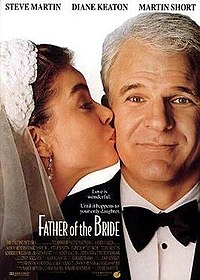
From that moment on I decided to shut my mouth and go with the flow. Los Angeles-based shoe factory proprietor George Banks (Steve Martin) leads the perfect life with his wife Nina (Diane Keaton), beloved twentysomething student architect daughter Annie (Kimberly Williams) and little son Mattie (Kieran Culkin). However, when Annie returns from her semester in Rome with Bryan Mackenzie (George Newbern) her new fiancé in tow, he has a hard time letting go of her. George makes a show of himself when he and Nina meet Bryan’s parents at their palatial Hollywood home; then Nina and Annie plan a grand celebration with bizarre wedding planner Franck Eggelhoffer (Martin Short) and the costs escalate wildly to the point where George believes the entire scheme is a conspiracy against him … It’s very nice. We’ll change it all though. Let’s go! This remake and update of the gold-plated classical Hollywood family comedy is much modernised by husband and wife writer/director Charles Shyer and screenwriter Nancy Meyers but retains a good heart. Carried by a marvellous cast with Martin superb in a difficult role – sentimental and farcical in equal measure as he confronts a crisis triggered by the loss of his darling little girl to another man! – his voiceover narration is perfectly pitched between loss, self-pitying acceptance and mockery. It’s interesting to see Meyers lookalike Keaton back in the camp after Baby Boom (and not for the last time). The early Nineties era of comedy is well represented with Short side-splitting as the insufferable but indispensable wedding planner with his impenetrable strangulated locutions; and Eugene Levy has a nice bit auditioning as a wedding singer. The ironies abound including the car parking issue forcing George to miss the whole thing; and the first snowfall in Los Angeles in 36 years that means the absurd swans have to be kept warm in a bathtub (if nothing else, a brilliant visual moment). The updating includes giving Annie a career and given the dramatic significance of homes in Meyers’ work it’s apt that she is (albeit briefly) an architect – a homemaker of a different variety. George and Nina’s marriage is a great relationship model without being sickening – a tribute to the spot-on performing by the leads in a scenario that has more than one outright slapstick sequence – meeting the future in-laws at their outrageous mansion is a highlight. Adapted by Meyers & Shyer from the original screenplay written by another husband and wife team, Frances Goodrich and Albert Hackett, which was adapted from Edward Streeter’s novel. The eagle-eyed will spot the filmmakers’ children Hallie and Annie as Williams’ flower girls. Hallie has of course continued in the business and is a now a writer/director herself. Hugely successful, this was followed four years later by an amusing sequel. For more on this you can read my book about Nancy Meyers: https://www.amazon.co.uk/Pathways-Desire-Emotional-Architecture-Meyers-ebook/dp/B01BYFC4QW/ref=sr_1_1? dchild=1&keywords=elaine+lennon+pathways+of+desire&qid=1588162542&s=books&sr=1-1. Directed by Charles Shyer. That’s when it hit me like a Mack Truck. Annie was like me and Brian was like Nina. They were a perfect match









